A visit to the flashback to recollect the passage of Indian history and economy makes us realize that the encouragement to utilize ‘Swadeshi‘ products and services has been residing in our minds since then. And the concept has managed to deepen its roots to the core of our mindsets.
The result of this is much in buzz, the ‘Remove China Apps’ app.
The app made its debut with the launch on Google Play Store in the mid of May 2020. However, it made an early exit leaving no scope of coming back when Google scraped the app from the Google Play Store.
A Peek at What Happened
The initiative of ‘Made in India’ and ‘Vocal for Local’ by the Indian government got introduced to promote the citizens to buy things made in India rather than abroad. For instance, buy a laptop made in India over the same manufactured in China or any other country. The cause having all noble intentions and sentiments embarked on the journey of its implementation with due diligence from all segments. The objective was and is never to compete or let anybody else down.
However, something different has been perceived by the Jaipur based Indian firm, OneTouch AppLabs, the developer of the Remove China Apps app that led them to create it and ultimately violate the policy of Google Play Store.
What also caused and somewhat triggered the development of the Remove China Apps app is the much outrage against China amid Coronavirus pandemic. The belief that the virus traveled from China to the other parts of the world is one of the reasons for spurning Chinese apps in India.
The app happened to do totally what its name suggests. The Remove China Apps app allowed users to remove all the applications from their phones that were created in China. It helped the users identify the origin country of the app’s developer by comparing it with the database of apps developed in China. In simpler words, the app worked by scanning the user’s device for the apps as per their origin. It then showed the list of apps developed in China and allowed the users to keep or delete the Chinese apps as per their choice.
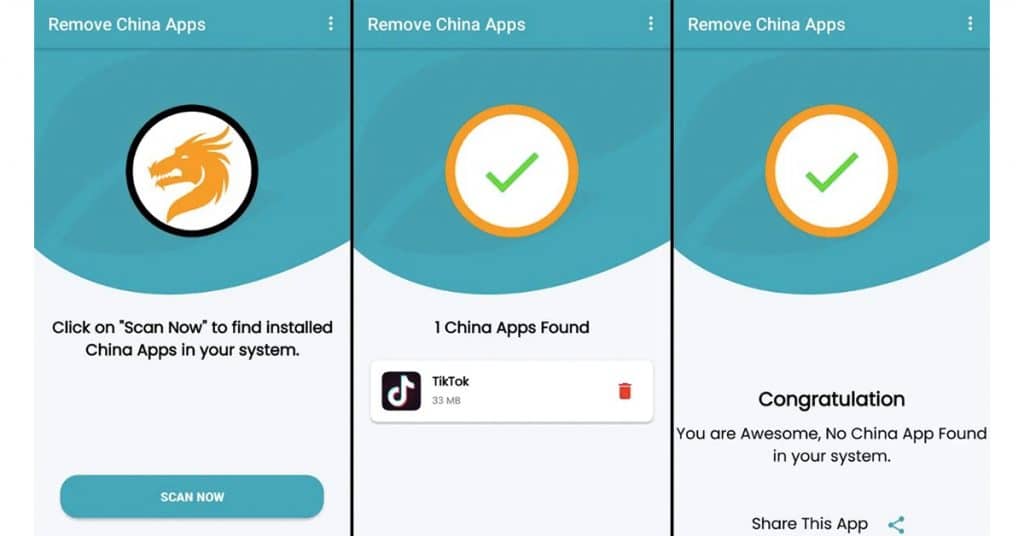
Over one million Indians downloaded the application on their phone to remove Chinese apps from their smartphones. The app even made it to the list of the top free apps on Google Play Store. Twitter, on the other hand, boomed with screenshots of people flaunting all the Chinese apps they deleted and contributed to the notion of Anti-China. Only a few possibly took out a moment to think of the permissions they were granting the app to go through their phones for a faux, shallow, and fanciful notion of patriotism.
The information obtained by the app from the phone of the app users included the number of clicks on a feature of the app, detailed network identification, and information concerning other apps installed on the phone. The app also alleged to collect data of the users to improve features and for betterment.
The app developers never provided any information regarding where the data was stored, and there was no clause mentioned for the data breach.
The idea that sounds scarier here is that the app had all the information about everything that a user had on his/her phone without the user’s knowledge of how they could have used it.
Nevertheless, it didn’t take long to come under Google’s sight. Google took the app down from the Google Play Store. The response of Google to the same was that it suspended several other apps as well for violating the company’s policy. The policy that several apps, including the Remove China Apps app, failed to comply with is – Deceptive Behaviour Policy of Google
The detailed explanation as per the policy for apps’ suspension is:
- The apps that modify device settings or features considering the user’s consent but perform in a way that is not easily reversible.
- Apps or advertisements that change device settings or features to provide service to third parties or for advertising purposes.
- Apps that delude users into deleting or disabling third-party apps or changing device settings or features.
- Apps that motivate users to remove or disable third-party apps or changing device settings or features unless it is part of an accurate and justifiable security service
The VP, Android, and Google Play at Google, Sameer Samat, further said, “This is a time-honored rule created to guarantee a healthy, competitive environment where developers can succeed based upon design and innovation. When apps are authorized to target other apps specifically, it can result in conduct that, in our opinion, is not in the best interest of our set of developers and consumers. We’ve implemented this policy in case of other apps as well in many countries in the past – just as we did here.”
While the ban of the app from Play Store prompted rage against the company, Google was only trying to work by all fair means by following its policies.
The Consequences
The consequences of the launch and suspension of Remove China Apps app came in two shapes.
The first is a direct hit on the Indian economy. Adopting such a way to get rid of a competitor is unethical. It also causes disservice at the end of Indian users.
However, here is the need to notice that China is not only a competitor but also a substantial investor in Indian firms. Such actions would result in economic tension and give a boost to other counterparts. Many top Indian firms have Chinese investors. And removing Chinese apps would make the situation worse for them, along with denting the Indian digital ecosystem.
China’s contribution to the Indian digital ecosystem is a significant factor in keeping the app ecosystem competitive. Thus, it is better to maintain the right level of the game by all fair means to profit the economy and users.
Where the above reaction was against removing the Chinese apps, the users’ response to the same was the opposite.
Soon after the Remove China Apps’ suspension, netizens reached out on Twitter to question Google’s decision. They made statements as well for wanting the app back. Many of them tagged Google CEO, Sundar Pichai, to accuse him of favoring China:
Here are some of the tweets from netizens expressing their anger to Google’s action:
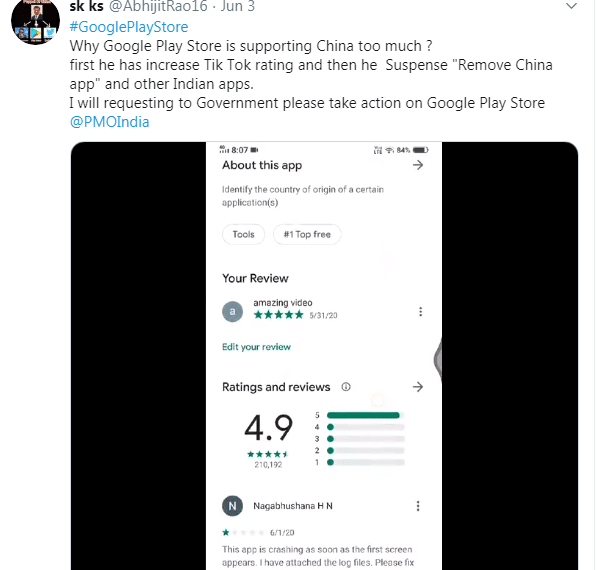
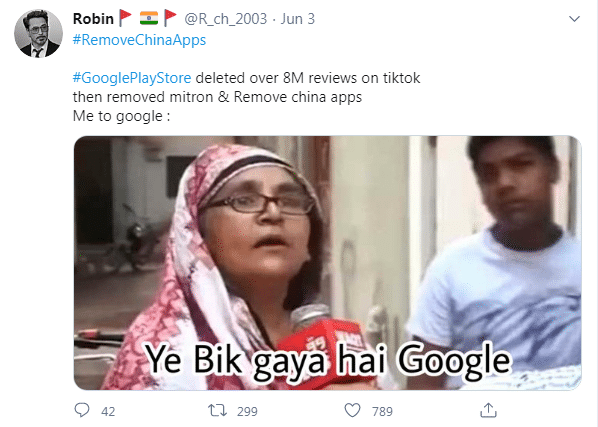
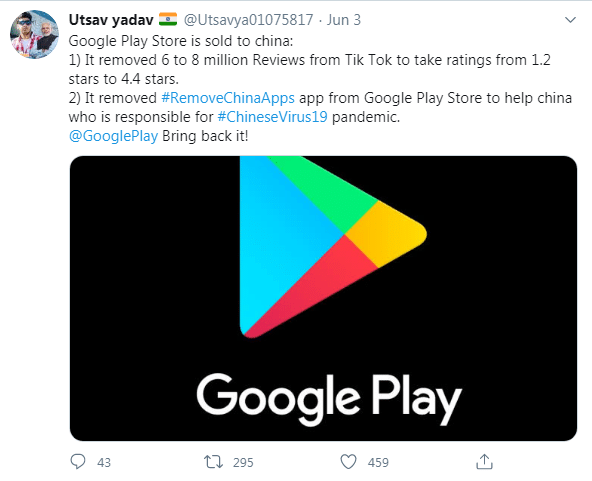
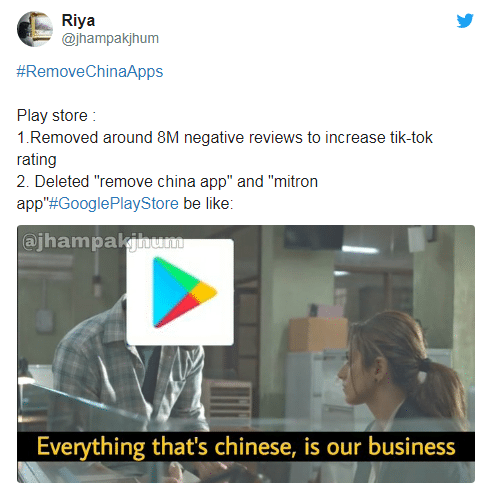
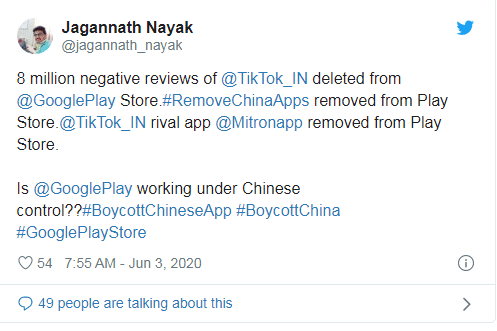
Instances from the History
A somewhat similar episode occurred a few days back with the Mitron app co-founded by Shivank Agarwal and Anish Khandelwal. It, too, was suspended by Google from the Play Store for violating the company’s policy.
Mitron was another different and new version of the TicTic app, which is already a clone of the Tik-Tok app. Promoting the anti-TikTok tales, the app in real had bought the entire source code, features, and user interface from a Pakistani software developer, Qboxus.
They just changed the logo and called it a made-from-scratch effort. The app soon got deleted from Google Play Store for violating the firm’s “Spam and Minimum Functionality” policy.
This policy doesn’t allow the apps that “Solely provide the same experience as the other apps already, make a place for themselves on Google Play Store.”
“Apps have to prove their worth to users by offering unique content or services,” the policy states.
Anish Khandelwal about the incident stated that they purchased the Mitron app’s licensed code and a template from Envato.
He also mentioned that the app’s primary focus was the maintenance of the original template they bought, and the developer’s origin was never shown as it wasn’t even relevant.
However, the Mitron app’s developer’s team is now working with Google to make amendments and bring it up on the Play Store again.
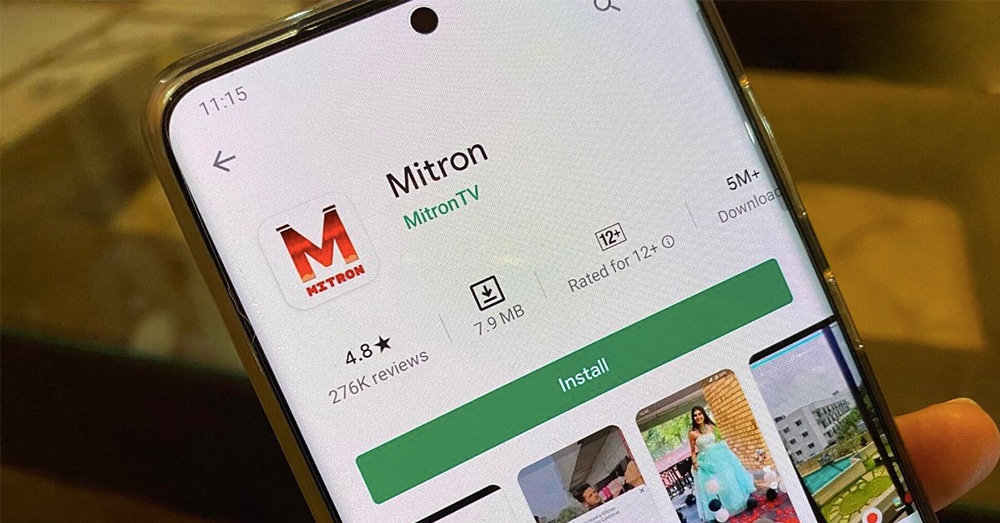
Also, moving a little more down the lane of history tells us of the occurrence from 2016, where a researcher of the Indian government found three apps that claimed to be stealing data in the name of offering news about defence services. The three apps included – Indian Sena News, Bharatiya Sena News, and India Defence News (IDN). They were available for download till early 2016 before being taken down.
While they just pretended to offer news about the Indian military, the underlying aim was to steal data. The app hosted Remote Access Trojans (RATs) that took the data and controlled the user’s device activity from a remote server.
Before being suspended, IDN’s Facebook page had over 1,200 likes from users with direct/indirect connections or background from the Indian Army.

The app’s sneaking actions included SMS theft, illegal video and call recording, and uploading of device files and screenshots in the background.
Using the stolen data, Pakistan’s ISI group managed to take over 40,000 Indian devices and sensitive information about specific significant individuals.
Conclusion
Do you now know where the problem arose?
In every instance mentioned above, the apps violated the Google play store’s policy of “Privacy, Security, and Deception,” which states that the company is committed to safeguarding user’s privacy with the provision of a safe and secure environment. Apps that are misleading, malicious, and plan to misuse or exploit any network or device along with personal data are not allowed.
It further states that one has to be crystal-clear in how they manage user data, which includes revealing the app’s access, data sharing, and restricting data usage for unknown purposes.
The only and the simplest thing that could have been done by these apps to avoid removal from the Play Store was just to serve their users and their needs with loyalty rather than breaching data – or letting any third-party app down!
The apps failed to prove to be trustworthy. However, as users, you need to look at what you are diving into to understand its depth!




